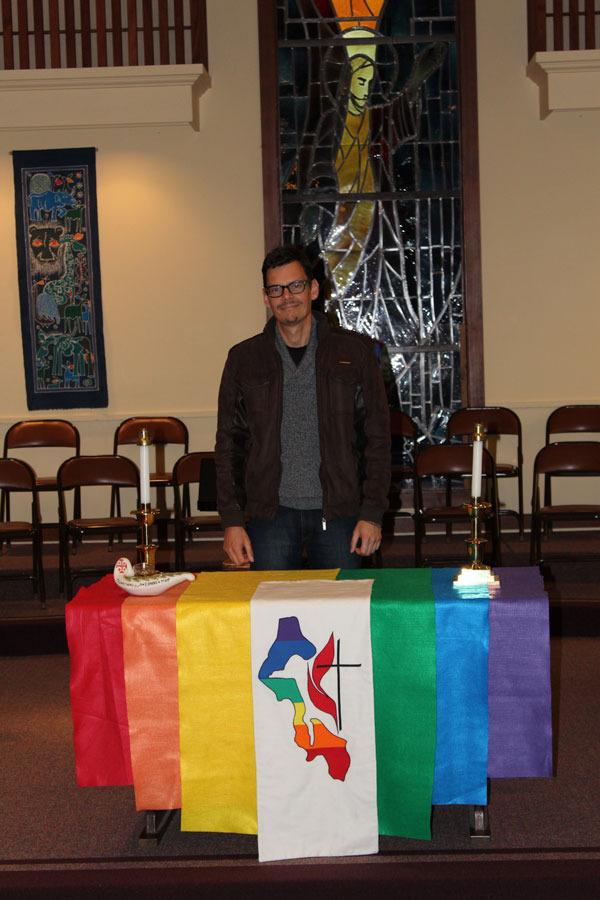A lifelong resident of South Africa, the Rev. Laurie Gaum is distinctly familiar with the injustice of apartheid and the unhealed, invisible wounds that lie in its wake.
Though Gaum is himself a white South African, a descendant of those who vied for the implementation and enforcement of racial apartheid, he has long faced a different sort of discrimination in his own community.
The first and only openly gay minister in the Dutch Reformed Church of South Africa, Gaum will be speaking about reconciliation of individuals of different sexes and sexual orientations in conjunction with his own life experiences at 7 p.m. Sunday, Oct. 11, at the Unitarian Universalist Congregation of Whidbey Island and at 9:30 a.m. the same day at the Langley United Methodist Church.
Fittingly, the day is also National Coming Out Day, as well as the seven-year anniversary of the Langley United Methodist Church’s commitment to become one of a network of thousands of churches to openly accept LGBTQIA — lesbian, gay, bisexual, transsexual, queer, intersex and asexual — individuals.
“It’s a real opportunity to hear this voice from another part of our world,” said Pastor Mary Boyd.
“It’s very affirming to me to be invited with so much openness,” said Gaum.
Gaum’s path to his present-day position was riddled with obstacles. Though the constitution of South Africa states that it is unlawful to discriminate against members of the LGBTQIA community, its religious institutions have yet to follow suit.
Gaum was reared in the Dutch Reformed Church of South Africa, an ultra-conservative religious body in which his father was a reverend. Early on, he recalled, he recognized that he was gay, a member of the LGBTQIA community which his religious leaders condemned unquestionably.
Rather than stepping away from the institution, Gaum quietly came out to his family before progressing through the ranks of the church, eventually becoming the pastor of his own congregation.
The church’s societal and political power, he said, could be harnessed for purposes good or “quite awful.” It was Gaum’s intention to do the former.
In confirmation classes, Gaum instructed the children in lessons of inclusivity. He omitted messages of discrimination toward individuals of different sexual orientations or gender identities, venturing off the well-trod path of his fellow church leaders.
Though he was at one point confronted by members of his congregation, Gaum had made gradual but steady strides in the way of equality within the church.
About 10 years ago, a catalyst came in the form of photos published in a tabloid magazine.
His partner, who would commit suicide hours later, had sold the revealing photographs in order to out Gaum, who had previously kept his sexuality from his church members and colleagues.
“I had to face up to many things at the same time,” Gaum recalled. “But I was also coming into myself.”
Initially defrocked by church officials, Gaum was eventually permitted to re-enter the church, thus becoming its first and only openly gay minister.
Though he has yet to be called upon by a congregation, he continues to preach inclusivity within the Center for Christian Spirituality, and is a trained facilitator with Gender Reconciliation International.
Gender Reconciliation International is an organization founded by Clinton residents Cynthia Brix and William Keepin which now spans eight continents.
South Africa, said Brix, has emerged as a leader in gender reconciliation trainings, and the organization has been commended by Nobel Prize-winner and social rights activist Desmond Tutu.
Brix and Gaum said they believe South Africa is susceptible to education in reconciliation due to its deep familiarity with the tragedy begot by segregation and oppression.
“There is definitely a correlation between them, in terms of justice,” he said regarding the similarities between racial apartheid and the oppression of LGBTQIA individuals, or those of different genders or classes.
During Sunday’s talks, Gaum said he intends to touch upon the subject of “ubuntu,” roughly translated as the idea of interconnectedness.
Though there is still much work to be done, said Gaum, he hopes to instill a sense of ubuntu between genders, those of different sexual orientations, classes and races.
“It’s ubuntu worldwide,” said Brix.
“It’s finding reconciliation between us all in this challenging time,” Gaum said.



